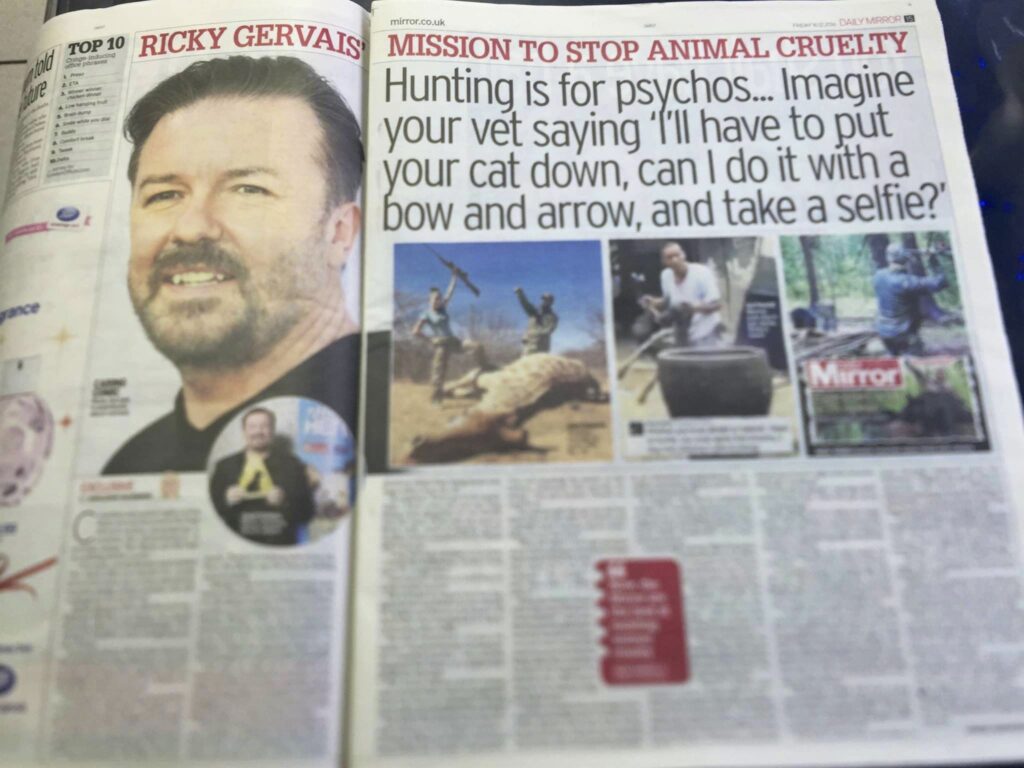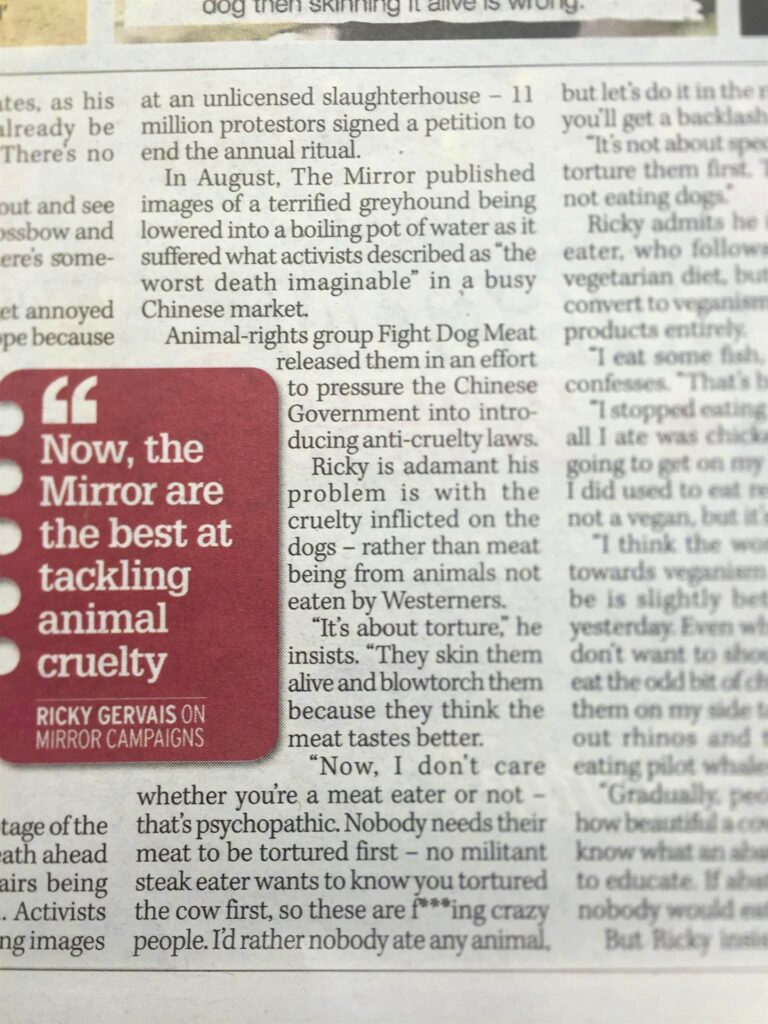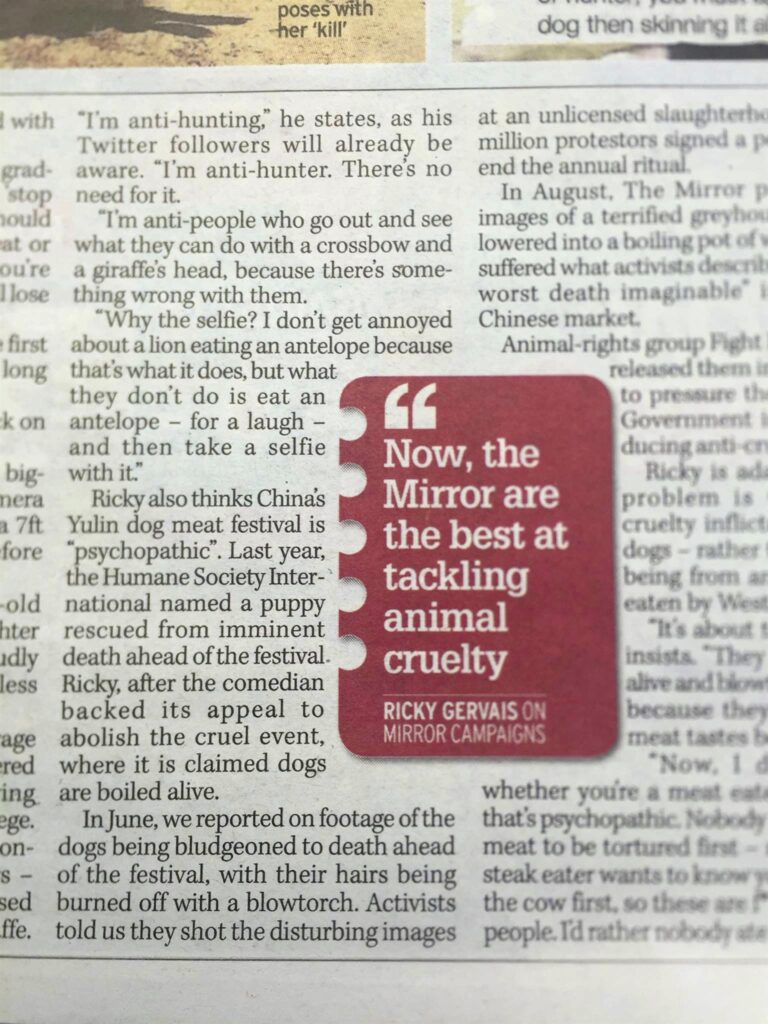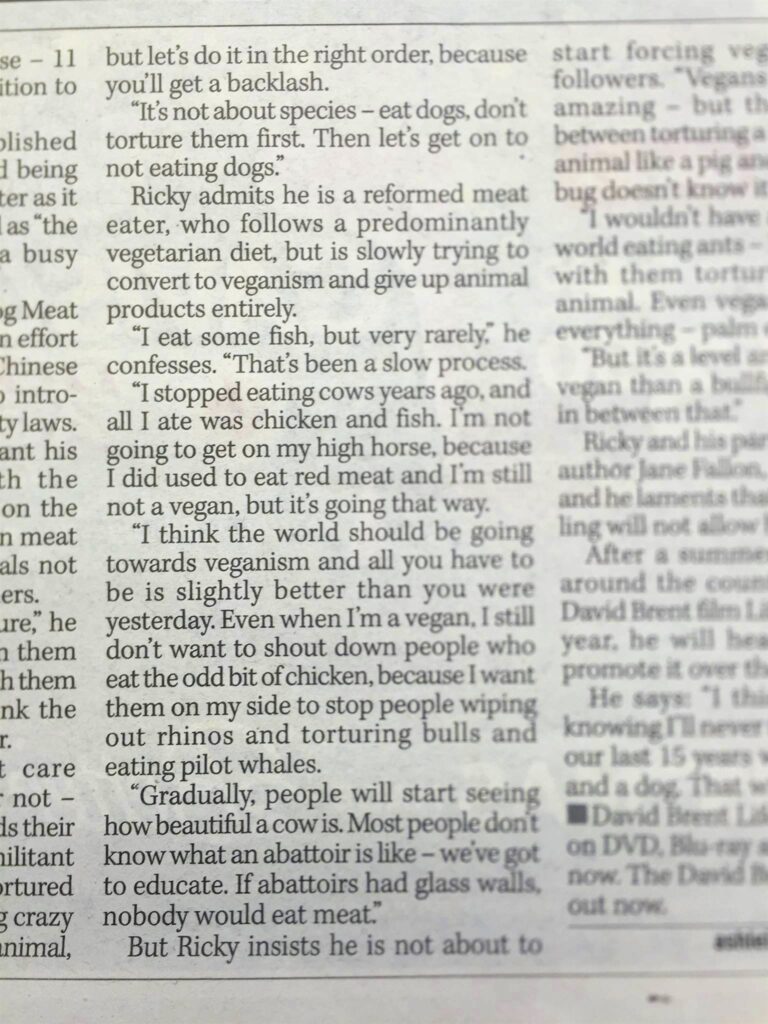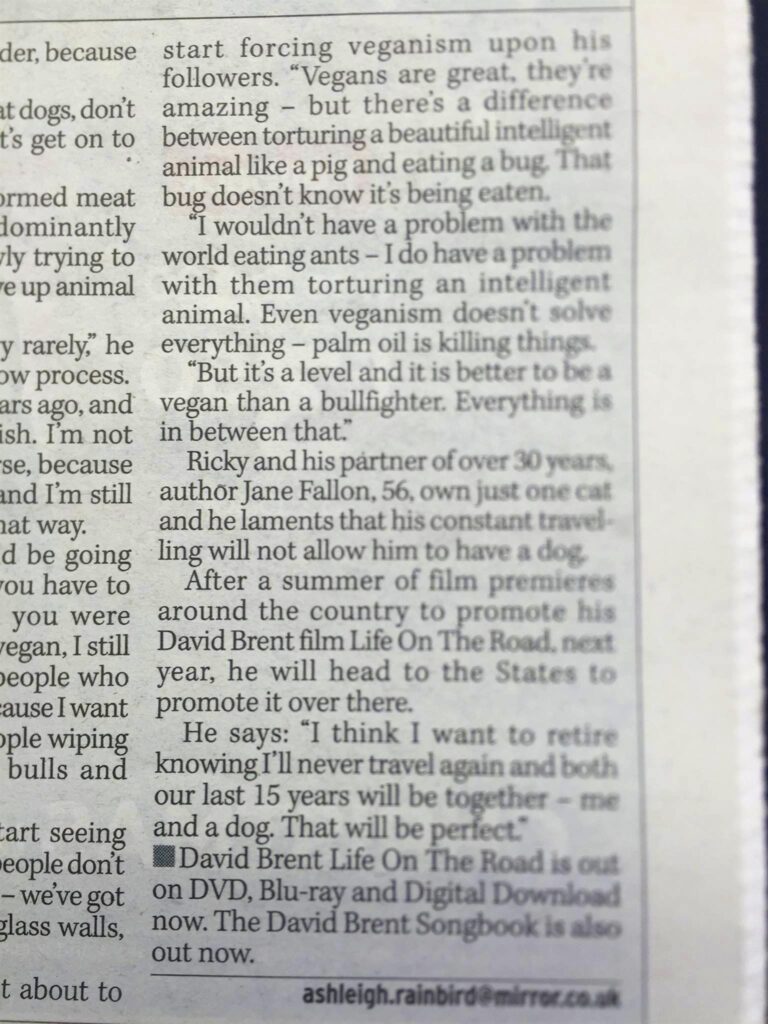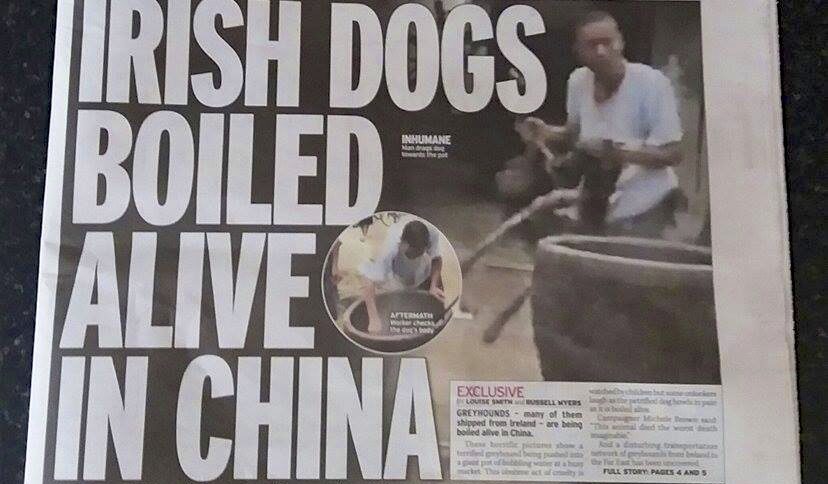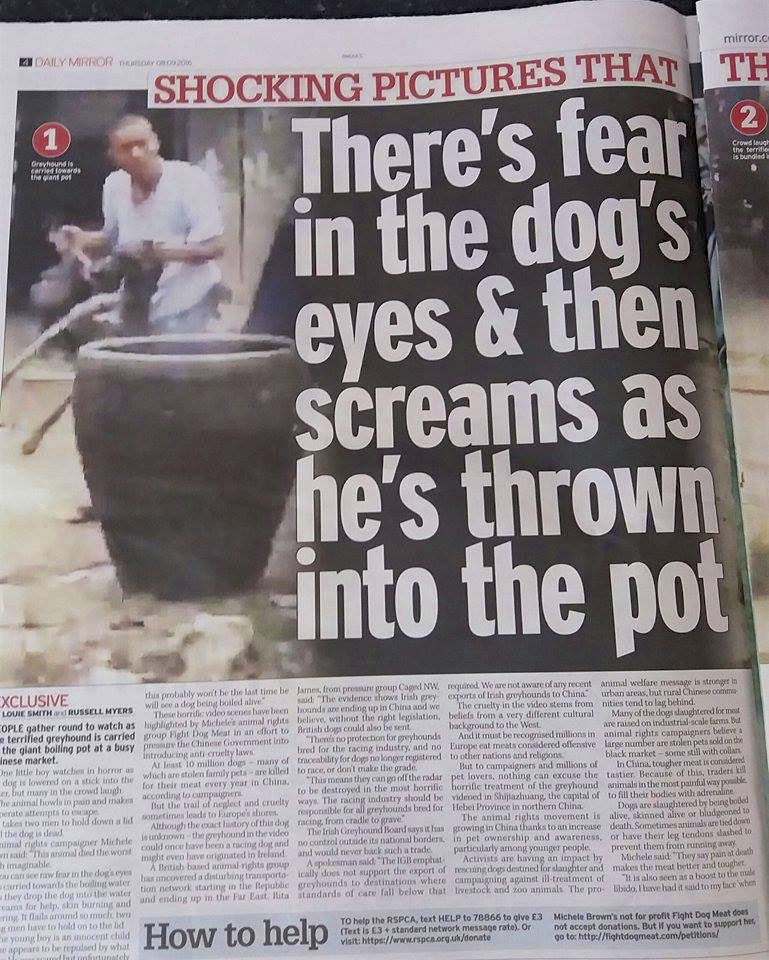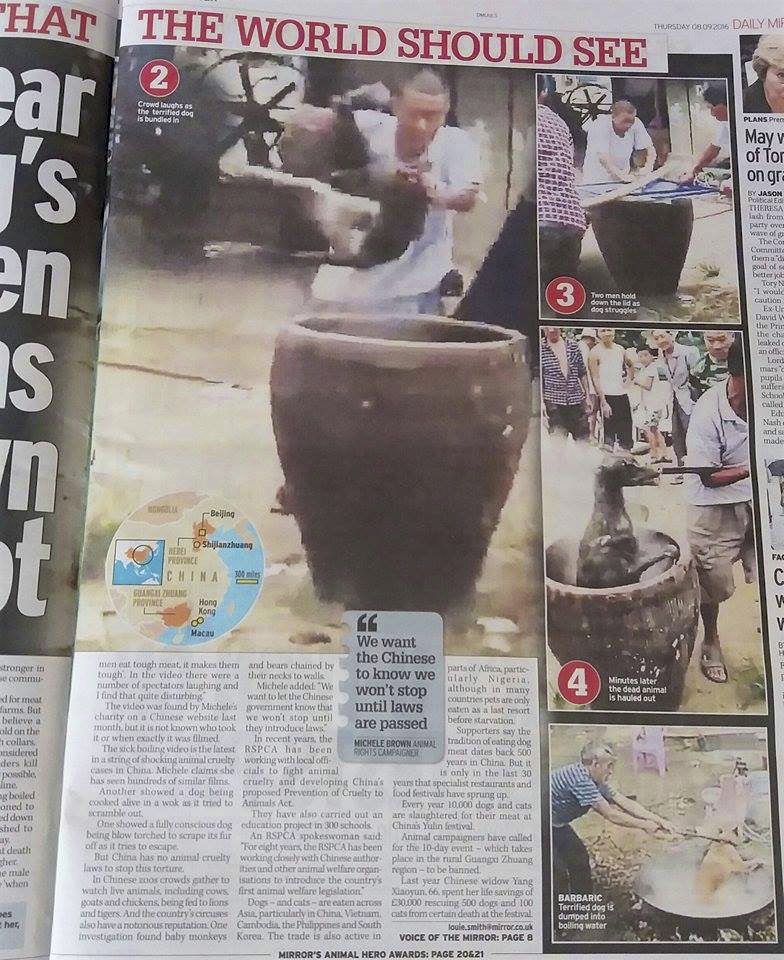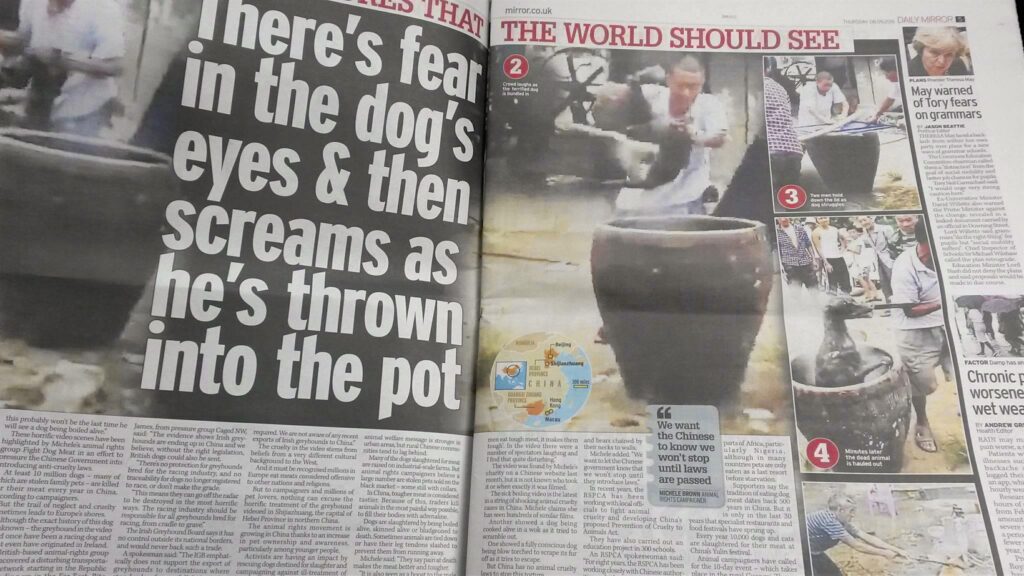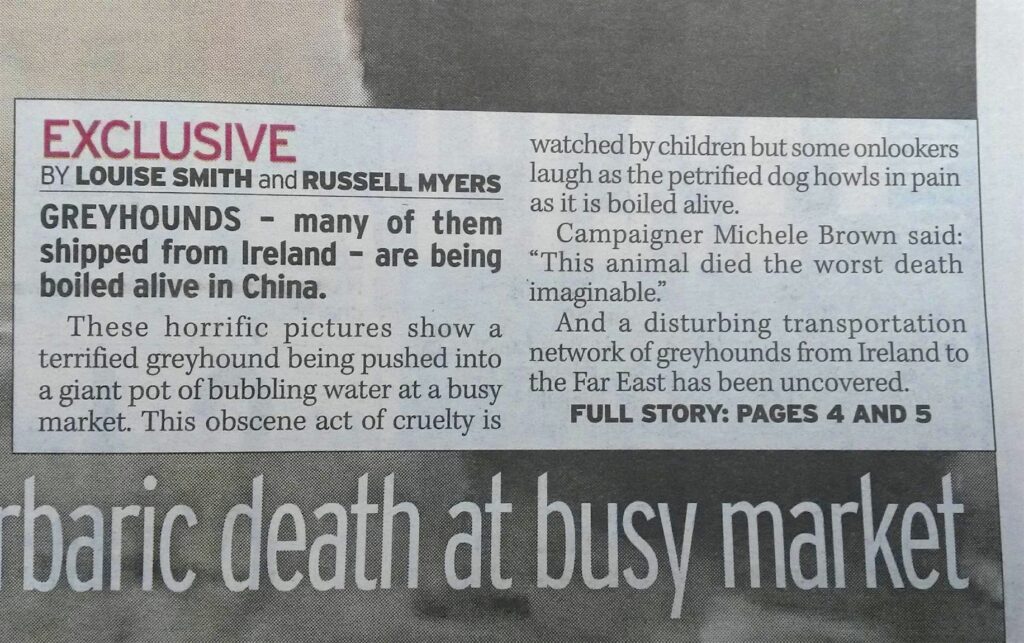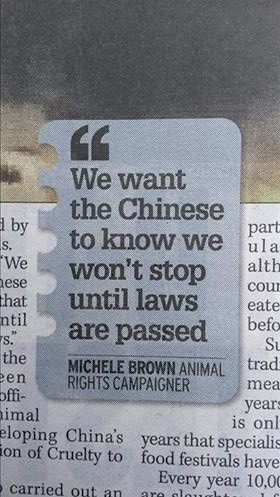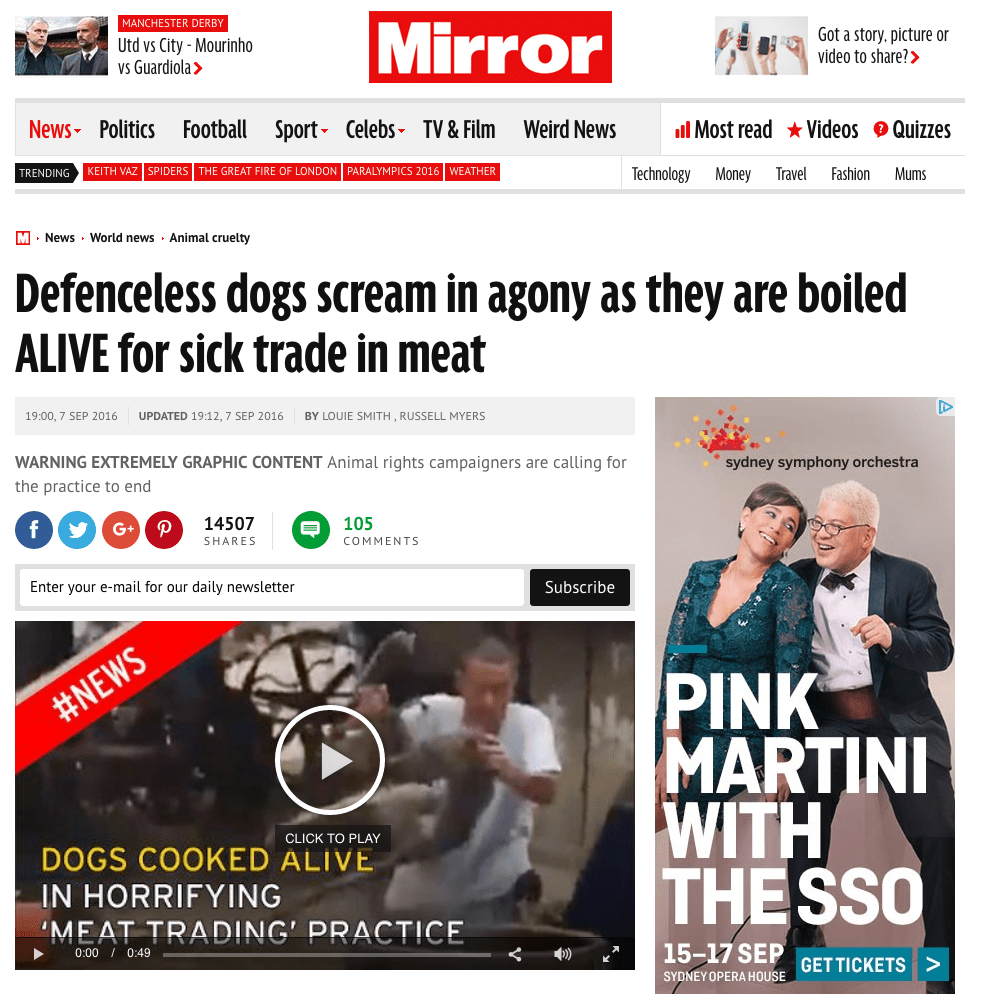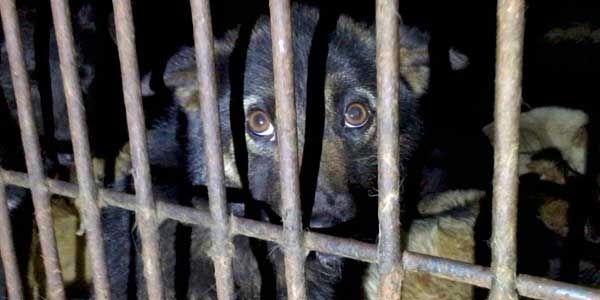
In 2018 the slaughter and eating of dog and cat meat is allowable and legal in all states except South Australia, which definitively prohibits its consumption. Current laws in the other states and territories of Australia do not prevent slaughter and/or human consumption of dogs and cats for personal use.
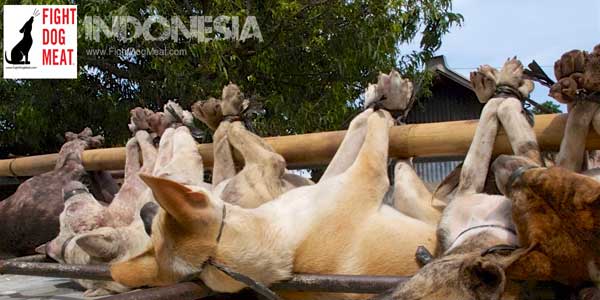
Indonesia has a large dog and cat meat trade which although marketed as “festive dishes,” is eaten as regular food on a daily basis, under the false belief it will boost a man’s libido and has medicinal powers.
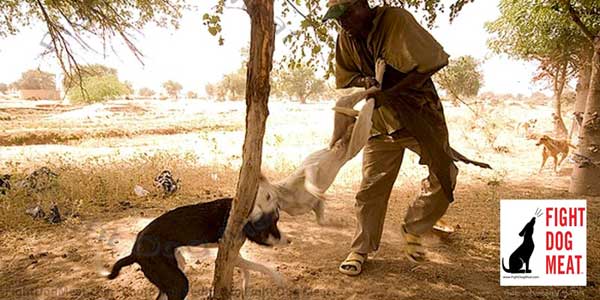
It is alarming that Nigeria’s dog meat trade is increasing despite the numbers of human deaths caused through eating infected dog meat, as the population rapidly climbs toward 200 million people. Nigeria’s dog meat trade has become so prosperous that dogs are taken from surrounding countries such as Niger and transported into Nigeria, to bolster it’s growing demand for dog meat.
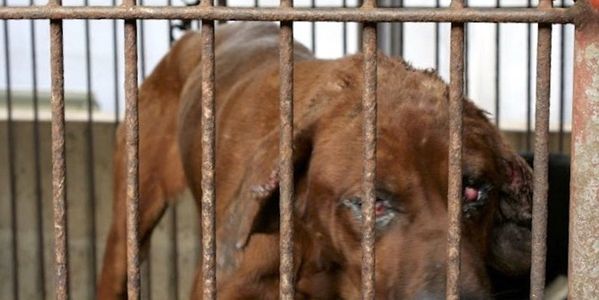
As a world leader in technology, it is time for South Korea to take a stand on animal welfare and enact its current animal protection laws. South Korea’s lack of action in protecting companion animals such as dogs and cats casts a negative light on your country’s image as the “Land of the Morning Calm.” South Korea has become the “Land Of The Morning Scream” as residents living in proximity to any dog slaughterhouse will attest to. Instead of natural beauty with clear waters running in tranquil mornings, South Korea is filled with piercing screams of live animal torture and blood running on killing room floors.
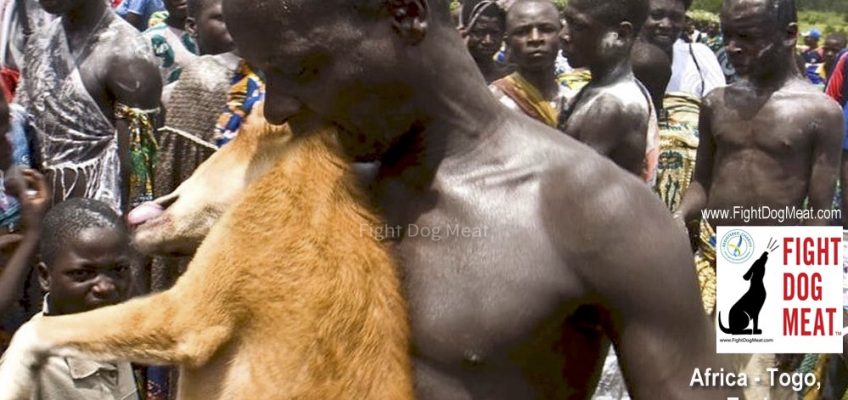
Each year thousands of teenage boys in Togo, Africa, go into isolation for a full week, to gorge on dog meat for a full seven days. The teenagers then reappear and spend the following week, first week of July, gorging on even more dog meat, as they compete in ‘traditional initiation’ wrestling competitions known as Evala, in Togo, Africa.
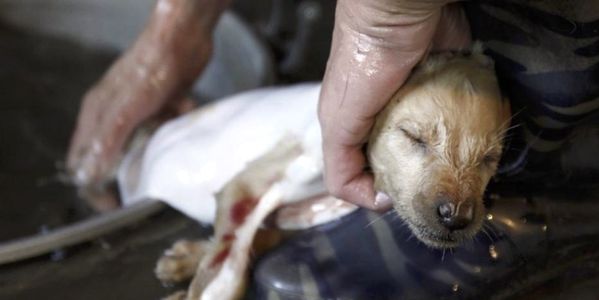
As a world leader in technology and development it is disappointing that China has no animal protection laws to guard the well being of it’s animals. We know positive change is possible for China’s animals after China brought in strict laws protecting Pandas from further slaughter, and that law was upheld and enforced immediately it was passed. It is time for China to end the brutally cruel dog and cat meat trade and issue animal protection laws, which will also be enforced. China’s dog and cat meat trade is one of the country’s most brutal areas of animal cruelty, where dogs and cats are routinely tortured in full view of passers by, who seem immune to what they are witnessing.
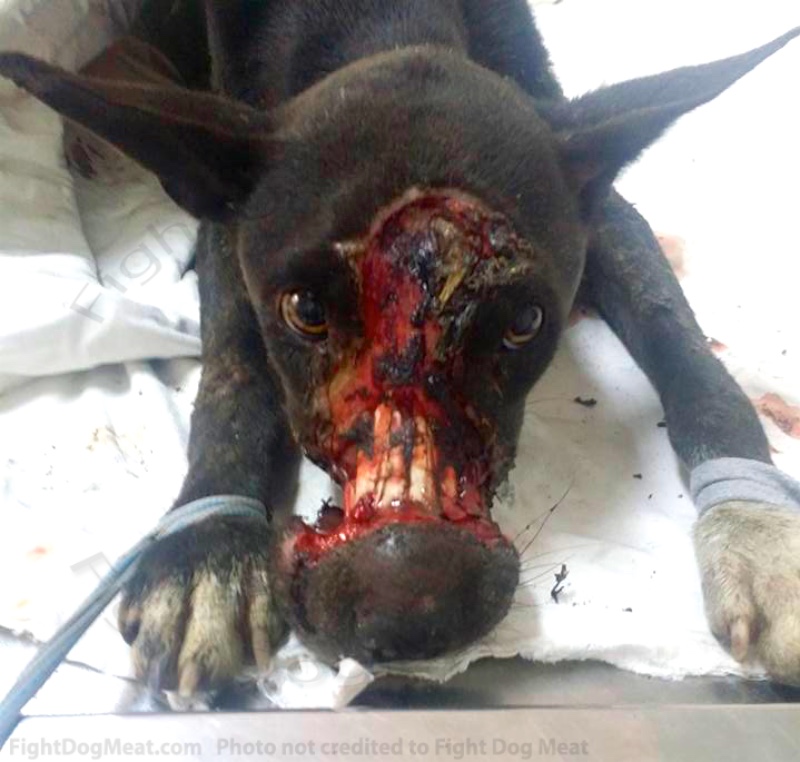
Despite Vietnam’s work to stop illegal smuggling of dogs and cats into Vietnam from Thailand and Laos, dogs are still smuggled in from different entry points. Vietnam has a growing number of pet owners who live in constant fear of having their pet stolen by local dog or cat thieves, whose sole mission is to sell their companion to a butcher for quick cash.
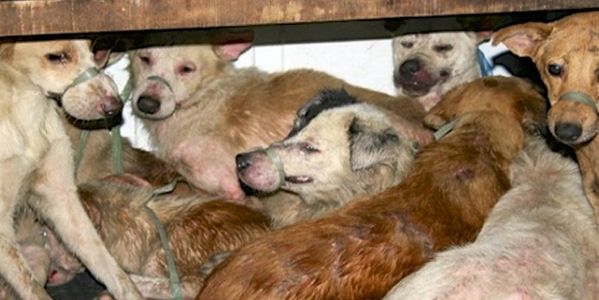
This is a second petition for the Philippines after the first petition site developed an issue, which has since been repaired.
Despite the Philippines strengthening the existing laws against animal cruelty, maltreatment and neglect, dog meat is still being eaten throughout the Philippines in the southern, central and northern parts of the country, as well as the Filipino dog meat trade being still active in the north.
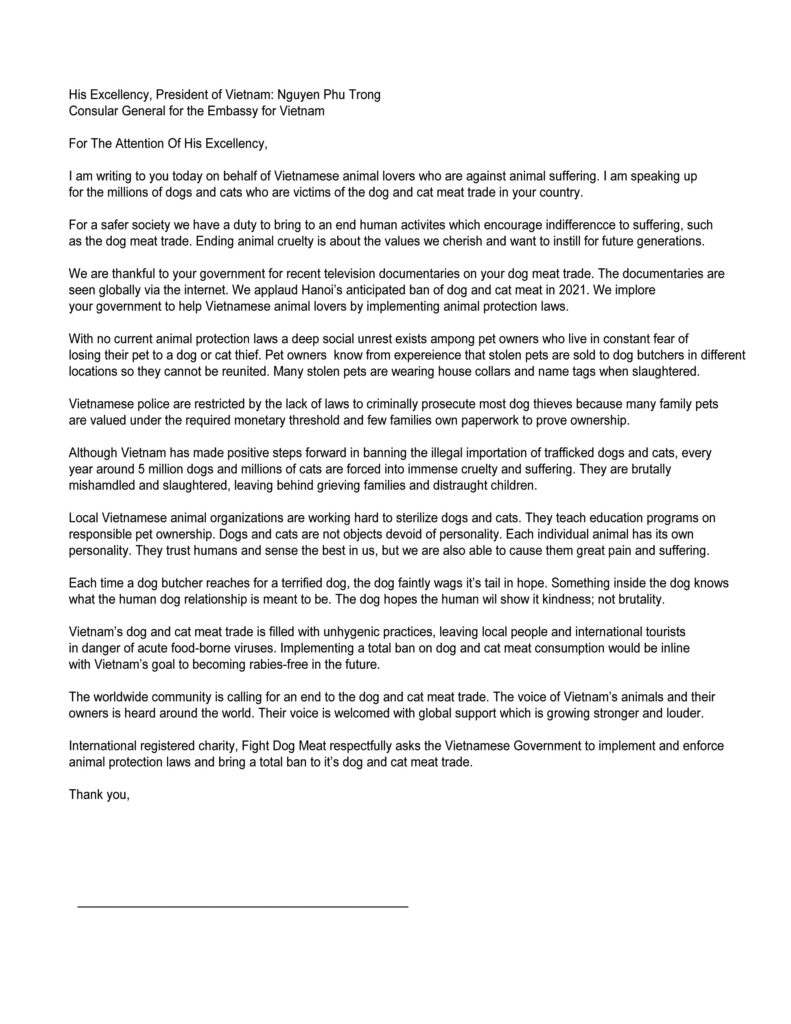
The letter can be mailed in the post or handed in to a Vietnamese Consular Embassy in your country.
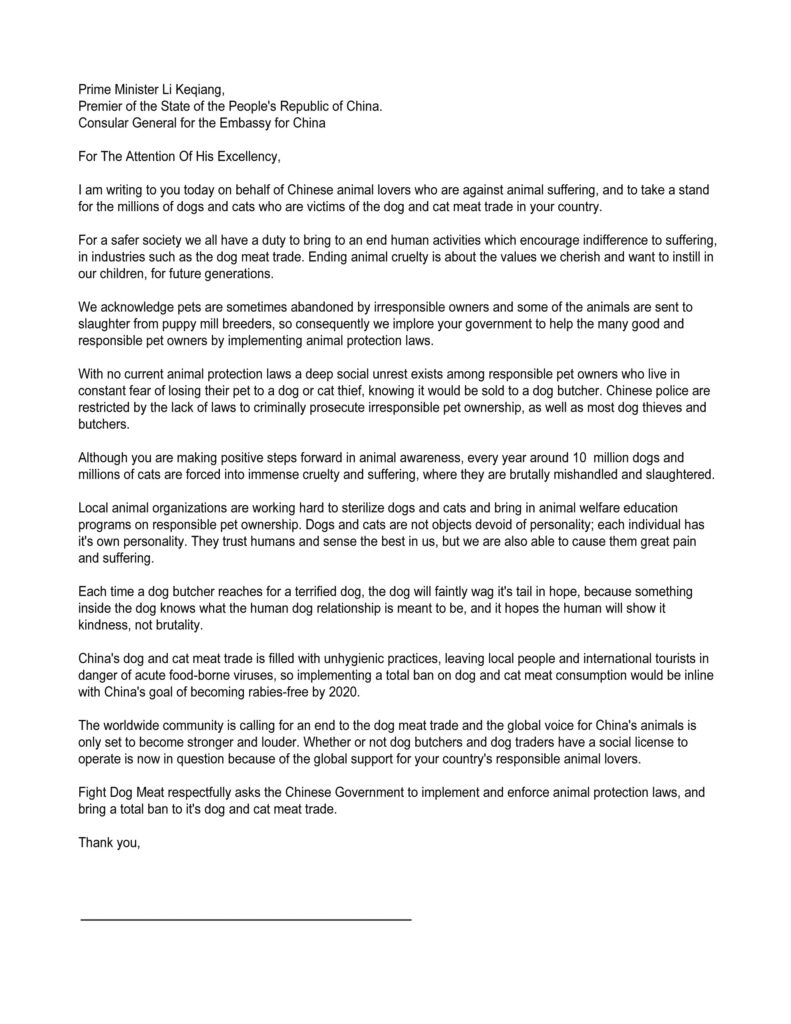
This Chinese Government letter is part of Fight Dog Meat’s ongoing Government Letter campaign, targeting dog and cat meat governments, embassies and consulates.
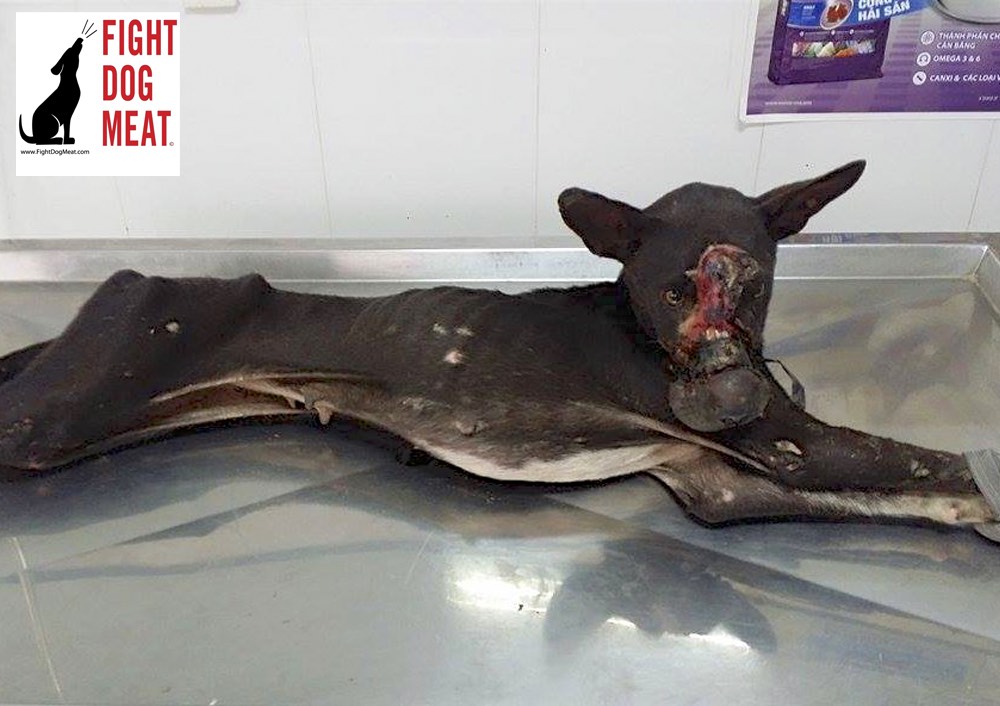
Vietnamese animal lovers are desperate for animal protection laws to be brought in and upheld in their country, and are calling for help.
Fight Dog Meat invite you to download our free posters, banners, flyers, bumper stickers and t-shirt logos to help end the dog and cat meat trade. Double click the graphic you wish to view in full size, to enlarge it.
The letter can be mailed in the post or handed in to a Vietnamese Consular Embassy in your country.
Google: Embassy of the Socialist Republic of Vietnam, and add your country, then embassy locations and addresses will appear.
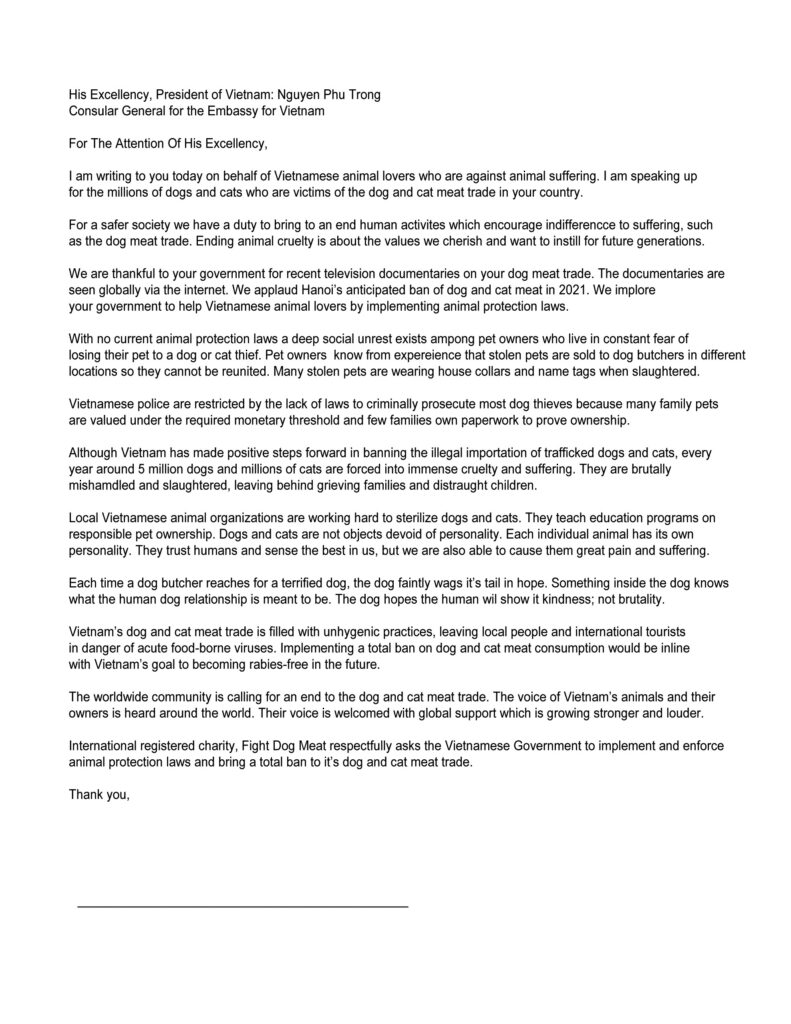
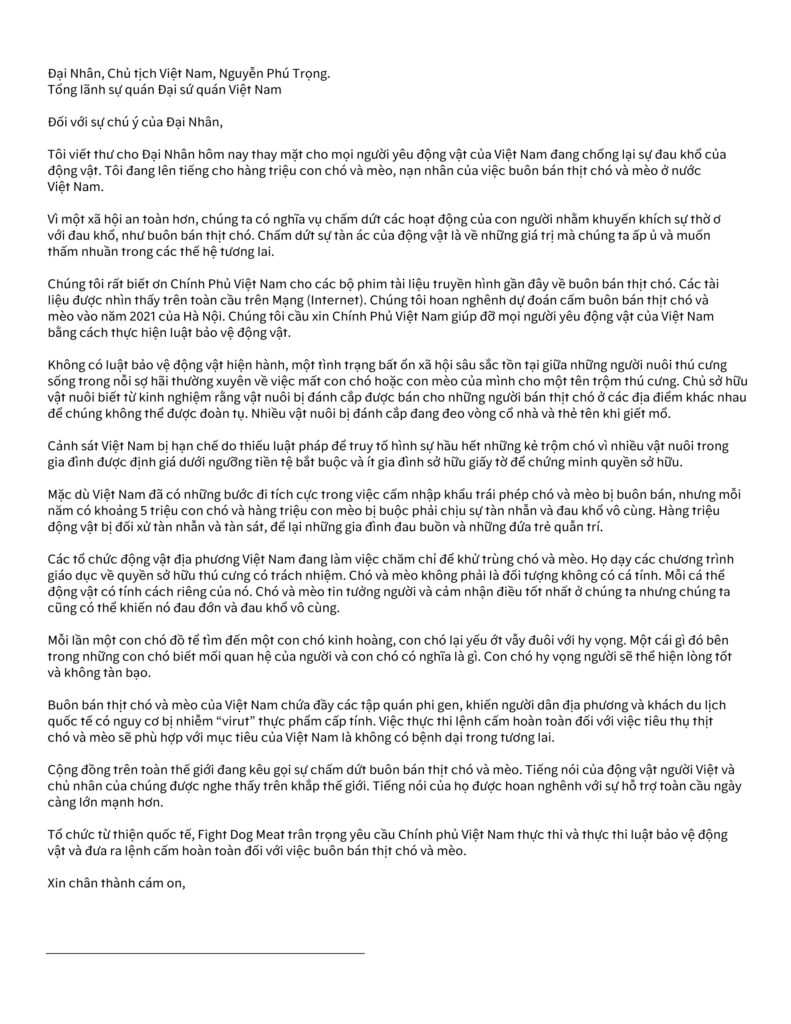
This Chinese Government letter is part of Fight Dog Meat’s ongoing Government Letter campaign, targeting dog and cat meat governments, embassies and consulates.
Please sign your name on the line at the end of the letter, and mail or hand deliver the following letter to a Chinese Consular Embassy in your area. Mailing addresses are listed below the letter.
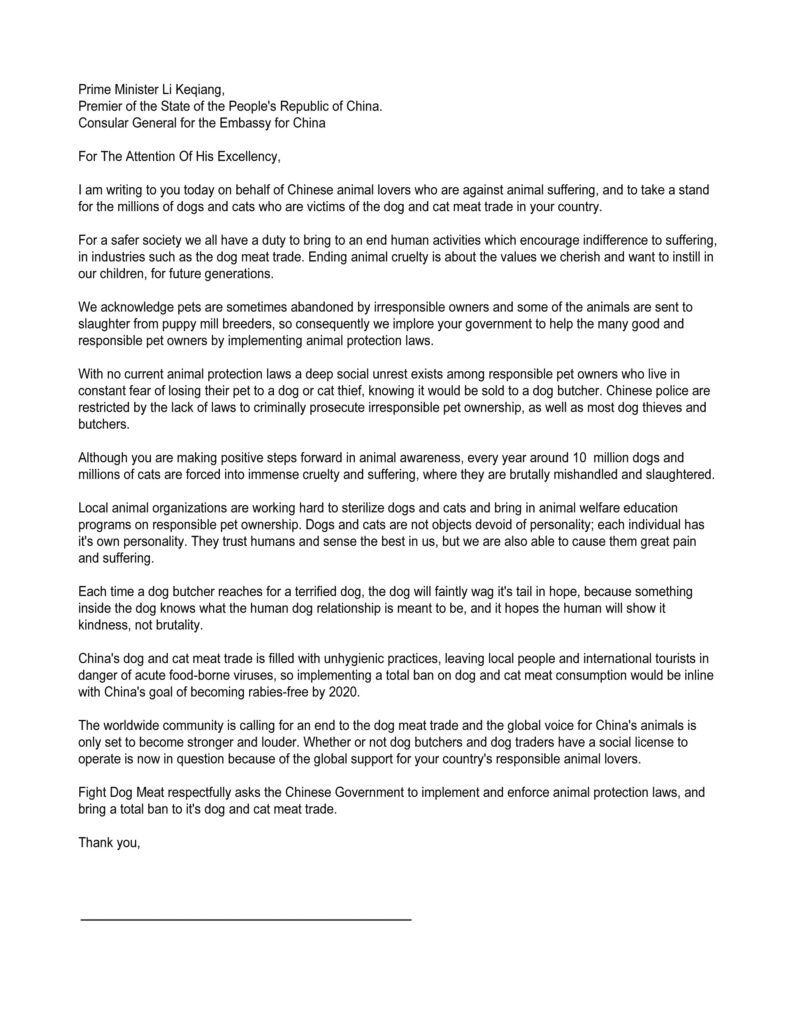
Department of Laws and Regulations
38.S.Yuetan Street, Beijing. China. Zip Code:100824
Department of Social Development
38.S.Yuetan Street, Beijing. China. Zip Code:100824
Department of International Cooperation
38.S.Yuetan Street, Beijing. China. Zip Code:100824
Embassy pf the People’s Republic of China in the United States of America
3505 International Place, N.W.
Washington. DC.
USA. 20008
TO FIND AN EMBASSY ADDRESS IN YOUR COUNTRY please check via this link: http://embassy.goabroad.com/embassies-of/china
To read the letter for Vietnam: Embassy Letter: Vietnamese Government.
Letters for more dog meat country governments will be published soon.
Thank you for reading,
Michele Brown,
Founder.
Vietnamese animal lovers are desperate for animal protection laws to be brought in and upheld in their country, and are calling for help. Local media is reflecting these concerns by increasing articles dealing with animal welfare and the social disharmony animal cruelty brings to the community.
Existing Vietnamese law stipulates stolen or confiscated ‘property’ must be destroyed by crushing or burning. Animals in Vietnam are often viewed as objects and therefore seen as property to be crushed or burnt. Animal protection laws are needed to clarify the status of animals as sentient beings.
Mid July 2016, half a ton of live cats and half a ton of live chickens were crushed to death inside the Vietnamese border after the truck from China was intercepted and found to have no certificate of ownership for its load. The live cats and chickens were crammed in bamboo cages, better described an tombs.
One year ago a similar situation occurred in Hanoi, where Vietnamese officials seized one ton of live cats originating from China, which were bound for Vietnamese cat meat restaurants.The bamboo cages loaded with distressed cats were thrown off the truck onto the road, causing serious injury to many of the cats.
The cages were then lined up on the road and tip trucks were brought in to drive up and down over the top of the loaded bamboo cages, gruesomely crushing the live cats. It is believed the haul of cats and chickens confiscated earlier this month were destroyed in the same manner.
A new Vietnamese Animal Health Law came into effect on July 1, 2016. Note: it is an animal health law and not an animal protection law. Chapter III of the Animal Health Law: Quarantine of Animals, Article 38 says: animals must have quarantine certificates, must be healthy, not cause spread of animal disease or harm to human health.
Article 39: at transport hubs animals must match their quarantine certificate by size and number, with codes and veterinary stamps. The animals have to pass a status of health check and failing this, transportation of the animals and animal products shall be suspended and handled in accordance with the law for the whole country.
Note the words: “handled in accordance with the law.” This carries great significance.
Dog and cat theft is only a misdemeanor in Vietnam, unless the value of the dog is over US$100 and the owner provides proof of ownership. Most Vietnamese pets are under US$100 and under the threshold for criminal charges to be laid. Dog slaughterhouses are scattered with discarded blood stained dog collars which are ripped off stolen pets during slaughter. The seriousness of this cannot be overstated.
Escalating violence from dog thieves toward pet owners has left many people in fear for their life, and their pet’s life. Vigilante justice is sometimes being served to dog thieves by local people, prior to police arriving on the scene and sometimes this results in loss of life. The photograph at the top of the page is of the Vietnamese dog “Newyear,” who escaped from a dog butcher with her mouth bound tightly shut and was rescued in Saigon, on New Year’s Eve 2015/2016.
A newly exposed area of animal cruelty in Vietnam is the fate of racing greyhound dogs, which are injected with insecticide to kill them, after racing too slow or becoming injured. Greyhound dogs being injected and dying in agony were filmed during an undercover investigation by Animals Australia, when researching live greyhound exports to Vietnam.
Its not only dogs and cats! The annual Nem Thuong Pig Slaughter Festival is where a live pig is tied down and cut in half for spectators to dip bank notes the pig’s blood, for good luck. Even the Vietnamese Prime Minister came out to support ending the festival, calling it “old fashioned, superstitious and negative.”
Vietnam has a history of harboring bear bile farms, often using bears which have been trapped alive in neighboring Cambodia’s forest. Couriers on their way to Vietnamese restaurants have been intercepted with freshly severed bear paws, for use in Bear Claw Soup which is seen by many as a sign of status. An undercover investigation by an Australian team a few years ago uncovered that most Bear Claw Soup customers in Vietnam, were wealthy westerners.
As wealth grows in Vietnam, so does the appetite for rhino horn, and other wildlife products, and live wildlife such as pangolins (or scaly anteaters), which have become the most trafficked mammal in the world. Live pangolins are preserved in wine as drinks, used for soups, or have their blood drained for drinking. They are being eaten out of existence. Pangolin scales are used for traditional medicine or as jewelry.
In Conclusion: please share this article and help create awareness for Vietnam’s innocent animals in desperate need. Fight Dog Meat will continue to fight for Vietnam’s animals and bring you information from the Vietnamese animal rescue teams whom we work alongside.
Thank you for reading,
Michele Brown,
Founder.
